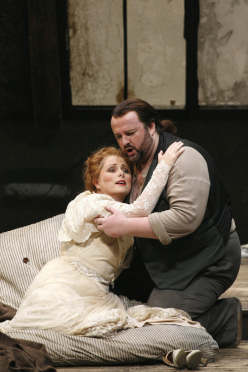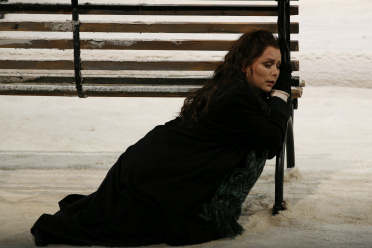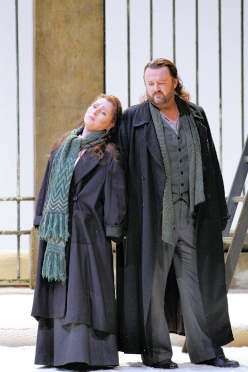|
Editorial Board
Melanie
Eskenazi
Webmaster: Len Mullenger
|
Seen and Heard Opera Review
Puccini, La bohème: (Revival Premiere) Soloists, Chorus and Orchestra of Welsh National Opera, Carlo Rizzi, conductor, Wales Millennium Centre, Cardiff, 15.9.2006 (GPu)
Conductor: Carlo Rizzi Original Director: Göran Järvefelt Revival Director: Caroline Chaney Original Designer: Michael Yergan Original Lighting Designer: John Waterhouse
Marcello: Jason Howard Rodolfo: Gwyn Hughes Jones Colline: David Soar Schaunard: Owen Webb Benoit: Howard Kirk Mimi: Rebecaa Evans Parpignol: Ian Yemm Alcindoro: Alastair Moore Musetta: Charlotte Ellett Customs Official: Julian Boyce Customs Sergeant: John Gilbert
Actors: David Tilley, Derek Tilley, Dewi Savage
“There is a story of Shostakovich asking Benjamin Britten what he thought of Puccini. ‘He wrote terrible operas!’, said Britten. ‘No, Ben’, said Shostakovich, ‘he wrote marvellous operas, but terrible music’”. So begins a piece on La bohème by the Earl of Harewood (who strongly disagrees with the judgements offered in this anecdote) in Kobbé’s Illustrated Opera Book (1989). “I have often said that if I could only save one opera score from destruction, it would be La bohème, not just because of what it means to me personally, but because of what it represents. It is the perfect opera score: not one note too many, not one note too few”. So begins an interview with Carlo Rizzi in the programme for this revival by WNO. “When the editor of this encyclopedia asked me to write about the opera that has meant most to me as a singer, I didn’t have to think twice about which one to choose … La bohème”. So begins a piece which Luciano Pavarotti contributed to The Metropolitan Opera Encyclopedia (1987).
It is easy to be sniffy about La bohème and more than a few intellectual critics - and more than a few other composers – have been thoroughly so. But experienced operatic performers generally take a very different view. Yes, it is a sentimental tale which at times seems to hope that we will take it for a tragedy. Yes, there is a certain formulaic quality to the way the music works – but what a good formula it is and how well it works. Listen carefully and the libretto, too, has a good deal going for it. Full of internal echoes (like the music), laden with genuine wit and humour, dramatically astute in the way it uses cold and heat, literally and metaphorically – the writing of Giuseppe Giacosa and Luigi Illica is a masterpiece of its genre. In combination with Puccini’s melodic invention and superbly judged orchestral writing – utterly fit for purpose – this really works. Before the curtain went up one of my neighbours in the stalls told me that she would try not to cry too loudly - La bohème never failed to make her cry.
This production directed by Göran Järvefelt has been part of WNO’s repertoire for some years, but this was a new, predominantly Welsh cast. Unpretentious and gimmick-free, with the director’s and designer’s intelligences employed creatively but undistractingly, this is a production which recognizes what matters in Puccini’s work and does all it can to facilitate a similar recognition in the audience. Järvefelt and revival director Caroline Chaney work imaginatively with stage positioning, details of action – little things such as Marcelllo’s being unable even to afford even an easel to paint at - and much else, but never foreground their own work at the cost of singers or music. Michael Yergan’s sets are basic, a raked stage which serves each of the four acts with changes which can be made pretty quickly – the pauses between acts being long enough to let the audience digest what they have just heard and build up their anticipation of what is to come, without losing the momentum of the narrative drive. Since each of the acts effectively occupies the real-time of its events, it is good to have short breaks between them, to mark the passage of unstaged time, as it were. Above all, this production benefits from the quite superb musical direction of Carlo Rizzi. Long an outstanding operatic conductor, Rizzi’s contribution here – and, therefore, that of the WNO Orchestra – is quite magnificent. His support of the singers is exemplary; he brings out, altogether unfussily, the detail of Puccini’s orchestration, without ever neglecting its power and directness; both rhythm and instrumental colour were lovingly rendered, though never in an even remotely self-regarding fashion. If I say that Rizzi came close to stealing the show, I don’t mean that he put himself before the singers or other aspects of the production; far, far from that; I mean only that his work was so perfectly, calculatedly, movingly musical that it was hard not to notice it, and even harder not to want to praise it.
All the principal singers acquitted themselves well, singing with commitment, generally sure techniques and considerable dramatic plausibility. In Act I Rebecca Evans’ Mimi was a girl whose almost child-like cunning (dropping the key etc.) did little to detract from her essential simplicity, and there was an effective matching simplicity in Evans’ singing, very beautiful in tone, without being over rich. One area of weakness in the opera’s libretto is that we learn little or nothing of Mimi in Act II; it makes it extremely difficult for any singer to convince us of the reality of the processes by which the Mimi of Act I has become the rather different woman of Acts III and IV. If Evans didn’t quite discover a psychological coherence in Mimi, she is not alone in that. What she did do was sing with affecting poignancy – not least in the Act III duet and in the demanding, but rewarding quasi-recitatives of the same act. As Rodolfo, the young tenor Gwyn Hughes Jones brought an eagerness and virility of voice that, if they weren’t always especially subtle, were consistently in the service of a moving and intelligent understanding of the character. Charlotte Ellett was a Musetta vivacious in both voice and movement in Act II, utterly convincing in the quarrels of Act III and genuinely touching as the more ‘sober’ figure of the final act. The Musetta created by Puccini, Giacosa and Illica has an underlying consistency of character absent from Mimi, and Ellett brought this out. The Marcello of Jason Howard was powerfully sung, but with a power modulated by wit and perceptiveness that allowed him to make real sense of the network of relationships in which he is located by words and music – with his flatmates, with Musetta, with, especially in Act III, Mimi. Both David Soar as Colline and Owen Webb as Schaunard made pleasant and effective contributions to the bohemian ‘landscape’, and played valuable roles in the ensemble work which was one of the impressive features of this production.
Not a ‘starry’ production, marked by any spectacular vocal triumphs, but a very rewarding one all the same; a reminder of what a good theatrical and musical work La bohème is. The work of Rizzi and the orchestra; the very considerable competence of the singing; the unflashy intelligence of production and design – all worked together to make a convincing case for at least one of Puccini’s “terrible operas” and for some of his “terrible music”. My neighbour in the stalls was in tears quite early in Act III.
Back to the Top Back to the Index Page |
| ||
|
||||





